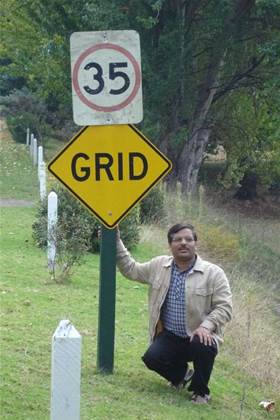The winner of this year's Medal for Excellence in Scalable Computing from the Institute of Electrical and Electronics Engineers hopes the accolade will further cloud and distributed computing research in Australia.
Rajkumar Buyya (pictured right) garnered the gong for his work on laying the economic foundations of cloud computing. He is in the throes of commercialising the Aneka technology that grew out of his work in the Grid Computing and Distributed Systems lab at the University of Melbourne.
He said the enhanced profile will aid his team further develop the technology for one of the few areas of IT that are benefiting from the global recession.
"(The award) demonstrates Australian research standing among the best at international level," Dr Buyya said.
"Now that Australian Research Council is moving towards excellence in research for (its) assessment, ch recognitions ... will help us in demonstrating quality work that is happening in Melbourne to funding bodies, which is likely to help us in having better success in future funding applications."
Aneka, built on Microsoft's .NET framework, assembles high-performance computing grids readily from underused desktop PCs and creates an economic model to charge users for the resources they use.
Grids are clusters of computers harnessed over a network to perform complex tasks. They are assembled quickly and scale to meet a variety of needs and are instrumental in creating the next-generation "cloud" infrastructure epitomised by applications such as Google Apps and salesforce.com.
Analysts at International Data Corporation late last year predicted such a "utility" model of computing, akin to flicking a light switch or turning a spigot, at $US42 billion a year will account for a quarter of IT spending in three years. With the recession biting, Gartner upped the ante last month estimating that cloud services will hit $US56.3 billion ($78 billion) this year and skyrocket to $US150 billion in 2013.
In making the award, the institute noted that Dr Buyya's technologies have gained "rapid acceptance and are in use at academic institutions and [businesses] around the world".
Dr Buyya receives an honorarium of $1000 and will present the opening keynote at next month's CCGrid Conference in Shanghai.
His presentation will define the architecture for creating markets and charging methods for cloud networks using technologies such as virtual machines, building networks for performance and directions for further research.

Australia's economic future written in the cloud
Looking beyond the immediate accolade, Dr Buyya said he is on a mission to transform Australia's economy.
"Cloud computing promises to offer utility-oriented IT services to users worldwide," Dr Buyya said.
"With the increased demand for delivering services to a large number of users, it becomes imperative to support scaling of application services to meet high quality of service expectations.
"Our work aims to transform Cloud computing by developing architectural principles for federation of clouds to scale applications across service providers and a software technology enabling a marketplace for trading cloud services and seamless scalability of applications."
He said the next 20 years will see utility computing shaping how business is conducted and services delivered and managed.
"This will have major impact on the services economy, which contributes significantly towards Australia's GDP," Dr Buyya said. "With the increased demand for delivering services to a large number of users, providers are looking for novel ways of hosting their application services on clouds at low cost while meeting users' quality of service expectations.
"During the next five years, we will work towards developing novel utility technologies ... transforming the Australian service industry and economy."
The previous winner of the medal was Jack Dongarra from the University of Tennessee and Oak Ridge National Laboratory.
This is an update of an earlier story including comments from the researcher.


_(33).jpg&h=140&w=231&c=1&s=0)


_(28).jpg&h=140&w=231&c=1&s=0)





 iTnews Benchmark Awards 2026
iTnews Benchmark Awards 2026
 iTnews Executive Retreat - Security Leaders Edition
iTnews Executive Retreat - Security Leaders Edition
 iTnews Cloud Covered Breakfast Summit
iTnews Cloud Covered Breakfast Summit
 The 2026 iAwards
The 2026 iAwards











_(1).jpg&h=140&w=231&c=1&s=0)



